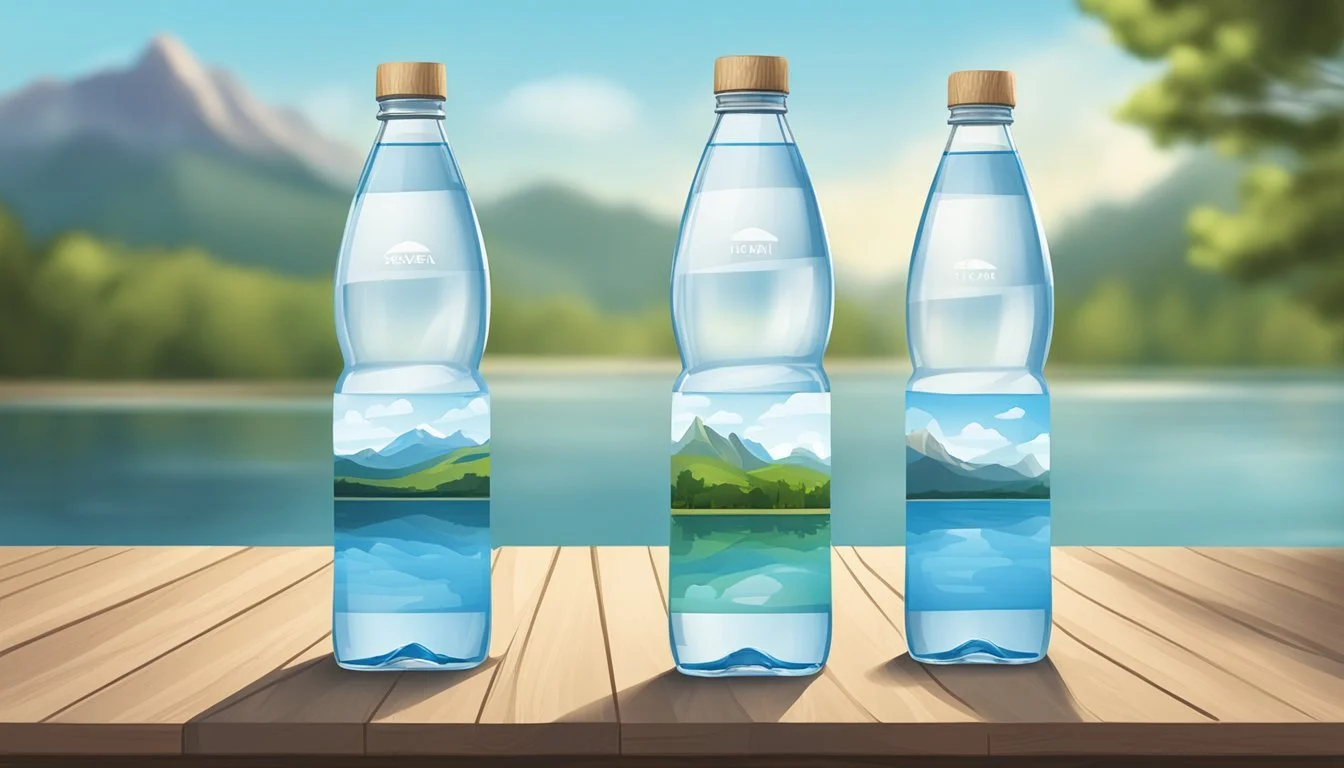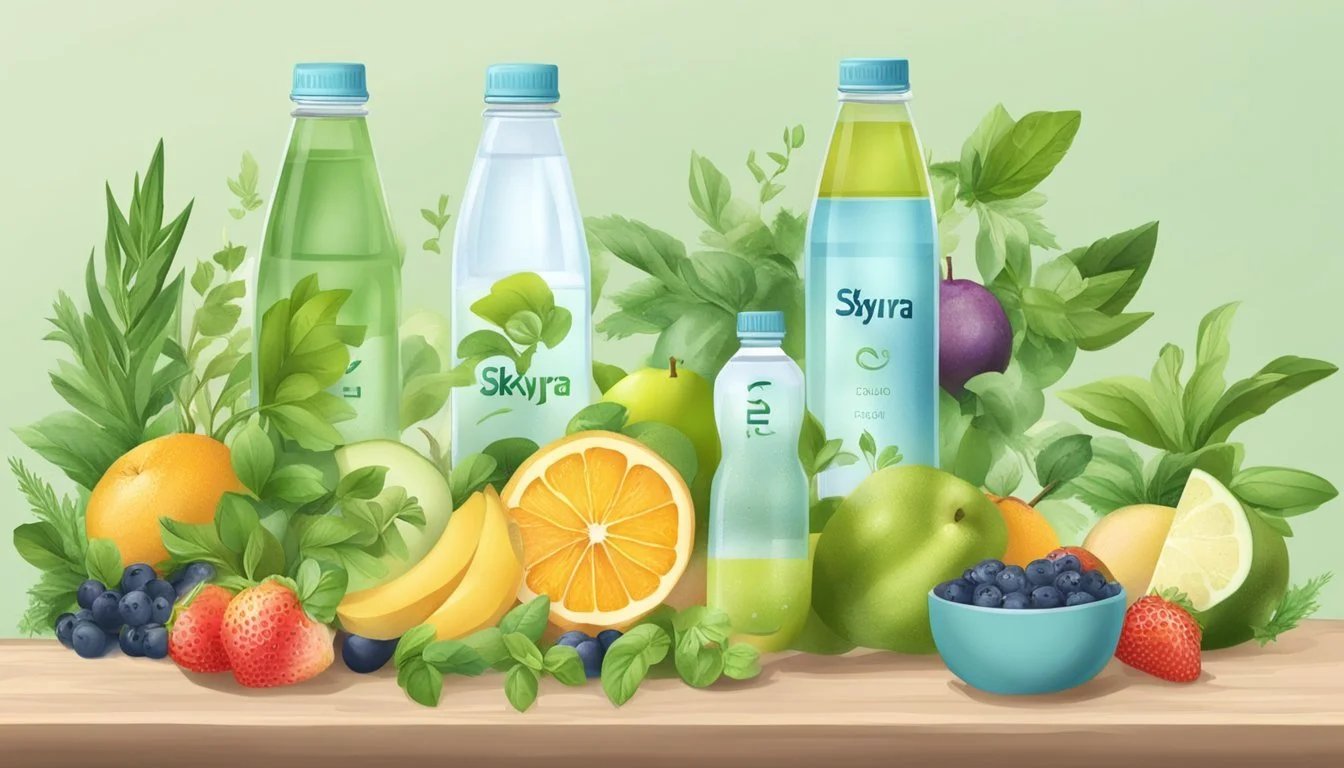Flow vs. Skyra
Comparing Premium Bottled Waters
When it comes to choosing the best bottled water, Flow and Skyra stand out as premium options that offer distinct benefits for different preferences. Flow is known for its alkaline spring water, promoting a high pH level and sustainable packaging with Tetra Pak. This emphasis on eco-friendly practices appeals to environmentally conscious consumers.
Skyra distinguishes itself with its natural Icelandic origin, boasting crisp and pure taste straight from Iceland’s pristine environments. For those prioritizing mineral content and taste, Skyra offers a superior experience with its high-quality natural filtration. Its unique volcanic filtration process provides naturally balanced electrolytes without any additives.
While both brands offer exceptional quality, the choice between Flow and Skyra depends largely on individual preferences for taste, pH level, and environmental considerations. Readers will find an in-depth analysis of these brands, helping them make a more informed decision about their bottled water choices.
Understanding Bottled Water
The discussion about bottled water encompasses various types, regulatory standards, and environmental considerations. These topics are essential for understanding what makes each brand unique and the broader impact of bottled water consumption.
Types of Bottled Water
Bottled water is categorized based on its source and processing method. Spring water comes from natural springs and is often rich in minerals. Purified water undergoes filtration processes like reverse osmosis or distillation to remove impurities and contaminants. Mineral water contains naturally occurring minerals without additional treatments. Sparkling water is carbonated and can be naturally effervescent or artificially carbonated. Lastly, alkaline water boasts a higher pH level, believed by some to offer health benefits.
Label Regulations and Definitions
Labeling regulations for bottled water ensure consumers are informed about the product. In the United States, the Environmental Protection Agency (EPA) oversees tap water, while the Food and Drug Administration (FDA) regulates bottled water. Bottled water labels must indicate the source, such as natural spring water, and any treatments the water has undergone. Added minerals must be listed, and terms like "purified" and "natural" follow specific definitions to prevent misleading claims. This transparency helps consumers make informed choices.
Environmental Impact of Bottled Water
The environmental impact of bottled water is significant. The production and disposal of plastic bottles contribute to pollution and resource depletion. Beyond the manufacturing process, the transportation of bottled water adds to its carbon footprint. Many brands are adopting eco-friendly practices, such as using recyclable materials and reducing plastic usage. Consumers are also encouraged to opt for environmentally friendly options, such as reusable bottles and tap water when possible. Efforts to understand and mitigate these impacts are crucial for sustainability.
Comparing Flow and Skyra
Flow and Skyra offer unique features and qualities, with distinctions in their brand values, water sources, purification processes, flavors, and packaging.
Company Background and Brand Values
Flow is known for its commitment to sustainability and wellness. The company emphasizes environmentally friendly practices, using eco-friendly packaging and advocating for a healthy lifestyle.
Skyra, on the other hand, highlights the purity of its Icelandic origins. The brand promotes the natural filtration process through volcanic rock, aiming to provide high-quality, pristine water.
Flow's branding resonates with eco-conscious consumers, while Skyra appeals to those seeking natural purity and exceptional hydration.
Water Source and Purification Process
Flow sources its water from an artesian spring in Canada. The water undergoes minimal processing, preserving its natural minerals. This method ensures Flow maintains a high pH level, contributing to its health benefits.
Skyra derives its water from a self-replenishing Icelandic spring. The water is naturally filtered through basalt and lava rock, which naturally purifies it. This unique process results in a high pH of 8.88, enhancing its alkaline quality.
The sourcing and purification processes reflect each brand's commitment to quality and naturalness.
Flavor Profile and Water Quality
Flow’s water is praised for its clean and smooth taste. The natural minerals retained during the minimal processing contribute to its pleasant flavor, making it a popular choice for hydration.
Skyra offers a light, clean flavor with a subtle sweetness, attributed to its volcanic rock filtration. The naturally high pH provides a unique taste experience and additional health benefits.
Both waters are noted for their excellent quality and refreshing taste, each offering distinct flavor profiles that cater to different preferences.
Packaging and Convenience
Flow uses Tetra Pak® cartons that are environmentally friendly, emphasizing recyclability and reduced plastic use. The packaging is designed for both convenience and sustainability.
Skyra bottles its water in recyclable plastic bottles. The focus is on maintaining the water's purity and quality from source to consumer, ensuring convenient access to high-quality hydration.
Flow’s eco-conscious packaging appeals to environmentally aware consumers, while Skyra's practical bottles offer ease of use and transport.
Health and Hydration
Flow and Skyra bottled waters offer distinct benefits when it comes to health and hydration, influenced by their hydration properties, pH levels, and mineral content. Below, each of these aspects is explored in detail.
Hydration and Electrolytes
Hydration is critical for overall health, and electrolytes play a significant role. Flow water contains naturally occurring electrolytes like calcium, magnesium, and potassium. These electrolytes help maintain fluid balance, nerve function, and muscle health.
Skyra water is sourced from Icelandic alkaline springs, which also provide essential electrolytes. The presence of sodium in both brands aids in retaining water in the body, making both brands effective for rehydration after physical activities.
pH Levels and Alkalinity
pH levels determine the alkalinity or acidity of water, which can impact bodily functions. Flow water has a naturally alkaline pH of about 8.1, attributed to its limestone filtration. Alkaline water is believed to neutralize acid in the bloodstream and may lead to better hydration levels.
Skyra water boasts an even higher pH level around 8.8, sourced from volcanic rock filtration. The elevated pH level might provide similar benefits by supporting the body's natural pH balance and improving hydration efficiency.
Mineral Content and Health Benefits
Minerals in bottled water contribute to overall health. Flow water contains a balanced mix of calcium and magnesium, which support bone health and metabolic function.
Skyra water offers higher levels of silica, a mineral that can benefit skin health. Both waters are free from heavy metals, ensuring safety and purity. The specific mineral composition, such as potassium and sodium, supports cardiovascular health and muscle function in both brands.
By understanding the health and hydration aspects of Flow and Skyra, consumers can make informed choices based on their specific health needs and preferences. Both brands provide significant benefits through their unique properties and mineral contents.
Taste and Culinary Use
Flow and Skyra each offer distinct flavor profiles and have specific uses in both fine dining and cooking. The following sections highlight differences in taste, optimal pairings, and various culinary applications.
Taste Tests and Flavor Comparisons
Flow and Skyra have both been subjected to taste tests by water sommeliers and consumers. Flow, sourced from natural springs, is known for its clean, slightly sweet taste with minimal impurities, making it a favorite among many for daily hydration. Skyra, on the other hand, delivers a more mineral-rich experience, resulting from its volcanic spring origins in Iceland.
In blind taste tests, Flow frequently scores higher for its smooth and refreshing flavor, ideal for those seeking a neutral palate. Skyra's robust, mineral-infused taste appeals to drinkers looking for a more distinctive flavor. Still and sparkling varieties from each brand offer diverse options, accommodating different preferences and occasions.
Water Pairings in Fine Dining
Water pairings in fine dining have become increasingly popular, with sommeliers choosing specific waters to complement particular dishes. Flow's subtle and pure flavor makes it an excellent accompaniment to delicate dishes like sushi or steamed fish, where the water's neutrality enhances, rather than competes with, the subtle flavors of the food.
Skyra's stronger mineral profile pairs well with richer dishes, such as grilled meats or creamy sauces, where the bold taste can stand up to, and even enhance, the meal. For a sparkling option, both Flow and Skyra offer effervescent waters that can cleanse the palate between courses, adding a touch of elegance to the dining experience.
Utilization in Cooking and Beverages
Chefs and mixologists often choose bottled water for its consistency and purity, which are crucial in delicate recipes. Flow's lack of impurities and balanced pH make it ideal for creating soups, broths, and teas, where the flavor of the water directly affects the dish's outcome. Its consistency ensures that flavors remain predictable and unaltered by chemical aftertastes.
In crafting beverages, Skyra's mineral content can add depth to cocktails and mocktails, making it a preferred choice for bartenders looking to enhance drink complexity. For example, Skyra's robust profile can improve the flavor of iced teas and flavored waters, adding a unique twist that still remains refreshing.
Consumer Considerations
When deciding between Flow and Skyra bottled water, consumers often weigh factors like price, availability, and customer experiences. Analyzing these aspects can help determine which brand might better meet individual needs.
Price Comparison and Value
Flow generally positions itself as a premium water brand, offering alkaline spring water with added minerals. This often results in a higher price per bottle compared to mainstream brands. Skyra, while also seen as premium, is priced competitively within the category.
Price varies by location and the retailer's pricing strategy. Bulk purchases can sometimes offer better value. For example, grocery stores may have discounts on larger quantities. Consumers should consider the price per ounce to assess value effectively.
Availability and Retail Presence
Flow is widely available in various retail settings, including major grocery stores and health-focused establishments. Its focus on eco-friendly packaging adds appeal, particularly in urban domestic markets.
Skyra is also accessible but might be found more often in high-end grocery chains and specialty stores. Both brands maintain a strong online presence, making them easy to order and ship directly to consumers.
Customer Reviews and Brand Loyalty
Flow receives favorable reviews for its crisp taste and eco-friendly packaging. Consumers appreciate the aesthetic appeal and sustainability of its products, which contributes to strong brand loyalty.
Skyra's reviews often highlight the water's refreshing quality and mineral content. While it may not have the same level of brand loyalty as Flow, it nonetheless enjoys a dedicated customer base that values its product offerings.
Customers often mention the convenience of having these brands available in multiple retail outlets, particularly in metropolitan areas.
More About Flow
Flow vs Whole Foods Italian Still Mineral water: Which Bottled Water is Better?
Mountain Valley Spring Water vs Flow: Which Bottled Water is Better?





